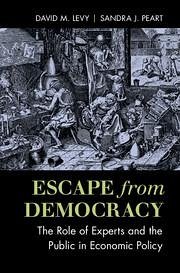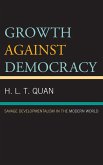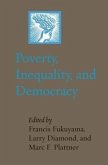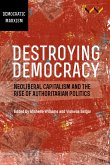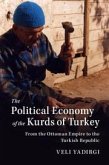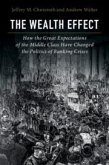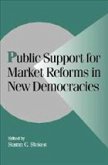David M Levy, Sandra J Peart
Escape from Democracy
The Role of Experts and the Public in Economic Policy
David M Levy, Sandra J Peart
Escape from Democracy
The Role of Experts and the Public in Economic Policy
- Broschiertes Buch
- Merkliste
- Auf die Merkliste
- Bewerten Bewerten
- Teilen
- Produkt teilen
- Produkterinnerung
- Produkterinnerung
This text interrogates the role of experts in governing and proposes a viable alternative: governing by democratic discussion.
Andere Kunden interessierten sich auch für
![Democracy at Risk Democracy at Risk]() Jeff GatesDemocracy at Risk20,99 €
Jeff GatesDemocracy at Risk20,99 €![Growth Against Democracy Growth Against Democracy]() Growth Against Democracy58,99 €
Growth Against Democracy58,99 €![Poverty, Inequality, and Democracy Poverty, Inequality, and Democracy]() Francis FukuyamaPoverty, Inequality, and Democracy34,99 €
Francis FukuyamaPoverty, Inequality, and Democracy34,99 €![Destroying Democracy Destroying Democracy]() Jane DuncanDestroying Democracy35,99 €
Jane DuncanDestroying Democracy35,99 €![The Political Economy of the Kurds of Turkey The Political Economy of the Kurds of Turkey]() Veli YadirgiThe Political Economy of the Kurds of Turkey34,99 €
Veli YadirgiThe Political Economy of the Kurds of Turkey34,99 €![The Wealth Effect The Wealth Effect]() Jeffrey M ChwierothThe Wealth Effect45,99 €
Jeffrey M ChwierothThe Wealth Effect45,99 €![Public Support for Market Reforms in New Democracies Public Support for Market Reforms in New Democracies]() C. Stokes (ed.)Public Support for Market Reforms in New Democracies30,99 €
C. Stokes (ed.)Public Support for Market Reforms in New Democracies30,99 €-
-
-
This text interrogates the role of experts in governing and proposes a viable alternative: governing by democratic discussion.
Produktdetails
- Produktdetails
- Verlag: Cambridge University Press
- Seitenzahl: 290
- Erscheinungstermin: 24. Dezember 2016
- Englisch
- Abmessung: 228mm x 151mm x 17mm
- Gewicht: 482g
- ISBN-13: 9781316507131
- ISBN-10: 1316507130
- Artikelnr.: 45163425
- Herstellerkennzeichnung
- Libri GmbH
- Europaallee 1
- 36244 Bad Hersfeld
- gpsr@libri.de
- Verlag: Cambridge University Press
- Seitenzahl: 290
- Erscheinungstermin: 24. Dezember 2016
- Englisch
- Abmessung: 228mm x 151mm x 17mm
- Gewicht: 482g
- ISBN-13: 9781316507131
- ISBN-10: 1316507130
- Artikelnr.: 45163425
- Herstellerkennzeichnung
- Libri GmbH
- Europaallee 1
- 36244 Bad Hersfeld
- gpsr@libri.de
David M. Levy is Professor of Economics at George Mason University, Washington DC. He has worked with Sandra J. Peart at the University of Richmond for fifteen years, and both have co-directed the Summer Institute for the History of Economics and have been honored by the History of Economics Society.
Acknowledgments
Part I. Introductory Themes: 1. Introduction
Part II. The Discussion Tradition: 2. On 'strongly fortified minds': self-restraint and cooperation in the discussion tradition
3. The Knightian moment
4. The rise of new welfare economics: an end to endogenous goals?
Part III. When Linear Models Fail: Two Cases: 5. Experts and eugenics: 'science' privileges a social goal
6. Expert judgment and Soviet growth
Part IV. An End to Discussion: Secrecy and the Temptation to Bias: 7. Experts and the philosopher's stone: John Law's secret financial alchemy
8. The consequence of suppressing discussion: imprudence with biased experts
Part V. Getting the Best out of Experts: 9. A revised code of ethics for experts
10. Mitigating the consequences of factional expertise
11. Inducing greater transparency
Part VI. Conclusion: 12. Vox populi?
Part I. Introductory Themes: 1. Introduction
Part II. The Discussion Tradition: 2. On 'strongly fortified minds': self-restraint and cooperation in the discussion tradition
3. The Knightian moment
4. The rise of new welfare economics: an end to endogenous goals?
Part III. When Linear Models Fail: Two Cases: 5. Experts and eugenics: 'science' privileges a social goal
6. Expert judgment and Soviet growth
Part IV. An End to Discussion: Secrecy and the Temptation to Bias: 7. Experts and the philosopher's stone: John Law's secret financial alchemy
8. The consequence of suppressing discussion: imprudence with biased experts
Part V. Getting the Best out of Experts: 9. A revised code of ethics for experts
10. Mitigating the consequences of factional expertise
11. Inducing greater transparency
Part VI. Conclusion: 12. Vox populi?
Acknowledgments
Part I. Introductory Themes: 1. Introduction
Part II. The Discussion Tradition: 2. On 'strongly fortified minds': self-restraint and cooperation in the discussion tradition
3. The Knightian moment
4. The rise of new welfare economics: an end to endogenous goals?
Part III. When Linear Models Fail: Two Cases: 5. Experts and eugenics: 'science' privileges a social goal
6. Expert judgment and Soviet growth
Part IV. An End to Discussion: Secrecy and the Temptation to Bias: 7. Experts and the philosopher's stone: John Law's secret financial alchemy
8. The consequence of suppressing discussion: imprudence with biased experts
Part V. Getting the Best out of Experts: 9. A revised code of ethics for experts
10. Mitigating the consequences of factional expertise
11. Inducing greater transparency
Part VI. Conclusion: 12. Vox populi?
Part I. Introductory Themes: 1. Introduction
Part II. The Discussion Tradition: 2. On 'strongly fortified minds': self-restraint and cooperation in the discussion tradition
3. The Knightian moment
4. The rise of new welfare economics: an end to endogenous goals?
Part III. When Linear Models Fail: Two Cases: 5. Experts and eugenics: 'science' privileges a social goal
6. Expert judgment and Soviet growth
Part IV. An End to Discussion: Secrecy and the Temptation to Bias: 7. Experts and the philosopher's stone: John Law's secret financial alchemy
8. The consequence of suppressing discussion: imprudence with biased experts
Part V. Getting the Best out of Experts: 9. A revised code of ethics for experts
10. Mitigating the consequences of factional expertise
11. Inducing greater transparency
Part VI. Conclusion: 12. Vox populi?

